Welcome to another Tinto Talks, where we delve into the details of the most top-secret project ever made.
This week we talk about something that is rather new to our GSG, and that is the concept of international organizations. Now this may sound like an anachronistic term, and when you read further in this Tinto Talks, you’ll go “but you already have this in previous games”. Yes, we did have some hard-coded systems in previous games, like the Holy Roman Empire, but what we have here in Project Caesar is a completely dynamic system, 100% scriptable and extendable for modders, which allows for many of these, and with far more flavor.
What is an international organization? Well, at its heart is a group of countries that share some common things, and then quite a few attributes that can be defined for them. The instruction file right now is 140 lines long, and it will keep growing.
Some examples of things that an IO can have are the following.
As we continue our development of this game, we keep adding more of these, adding more unique flavor to the game.
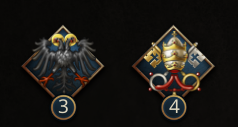
We have “control-groups” like every PDS game has had since EU1, and Stellaris added icons for quick selects… The one for Project Caesar can be pretty much anything in the game, and if you start as a member of an organization, you get a control group for it from the start.
Common Organizations
Let's take a look at some of the generic ones, some of these have been hard-coded systems in previous GSGs, and these are not unique organizations in a campaign, but can exist in multiple instances.
Coalitions
These can be created, with a country as a target, when the target has an aggressive expansion beyond a certain threshold.
Unions
This is a sort of defensive alliance between countries that share the same ruler. They may or may not have different levels of integration.
There are a few others like this, including defensive leagues and tribal federations.
Religious Organizations
Catholic Church
Every country in the world that is part of the Catholic faith is a part of this organization. They have issues that the cardinals vote on, and being a member has implications and restrictions. Of course, this has the added benefit of having Catholic pops in Catholic countries paying a tithe to the Church, which eventually finds its way into the Papacy.
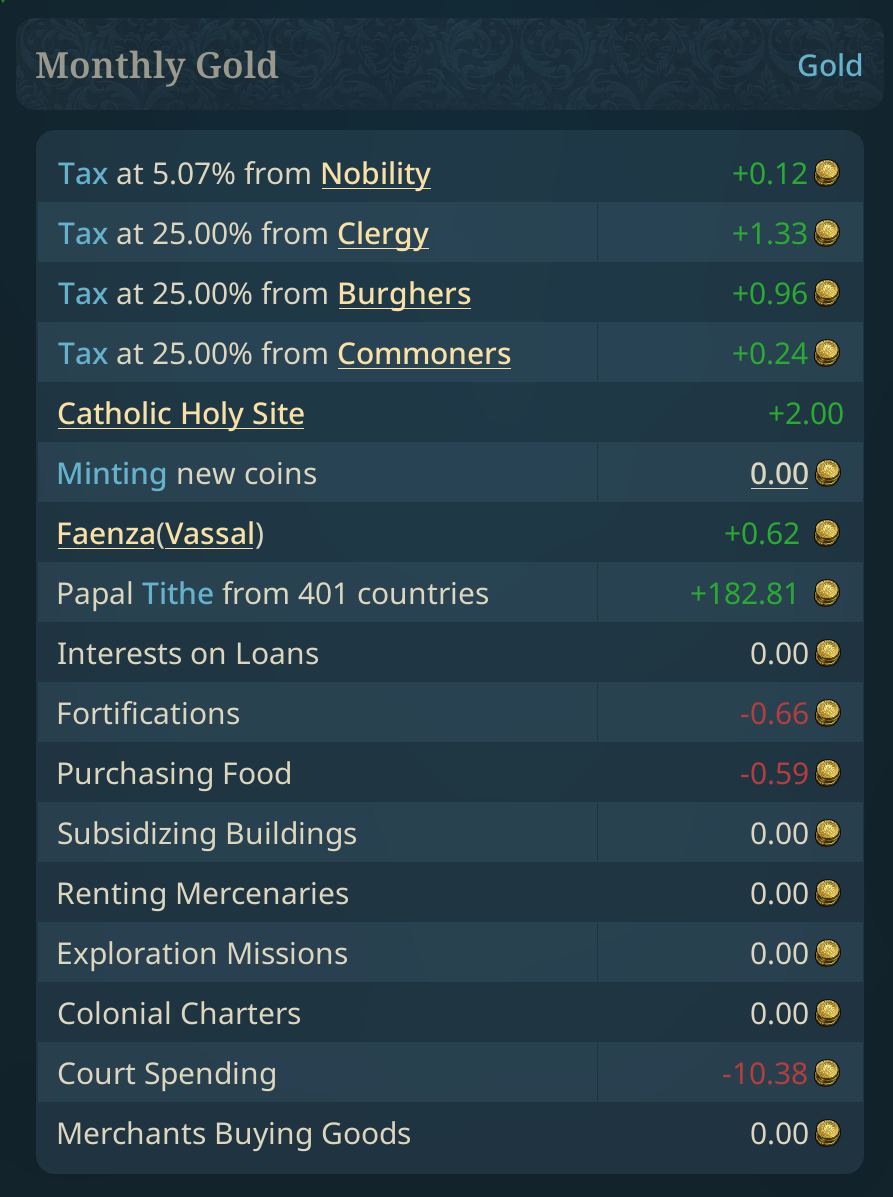
One reason to go Lutheran?
Crusades & Jihads
These are temporary international organizations that will be created when a Crusade or Jihad is called. They have a target set and act like an alliance against that country.
Autocephalous Patriarchates
Meaning self-headed, an Autocephalous Patriarchate is a metropolitan bishop in the Eastern Christian confessions which acts independently and does not depend on or answer to any other hierarchically superior church authority. The different patriarchates then have their own synods of bishops to decide upon anything affecting their own religious jurisdiction.
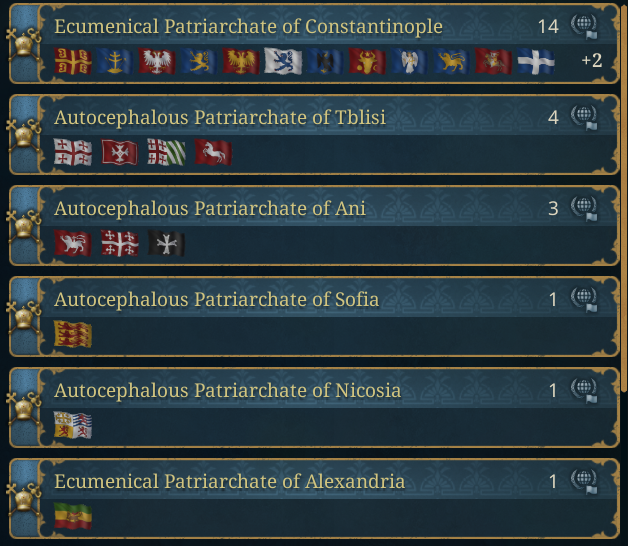
WiP grahics etc.
There are many of these, for Orthodox, Miaphysite, and other Eastern Christian confessions.
There are many more, some other religions have a central organization, and others have fragmented ones.
Specific Organization
There are also a fair amount of completely unique and flavorful organizations.
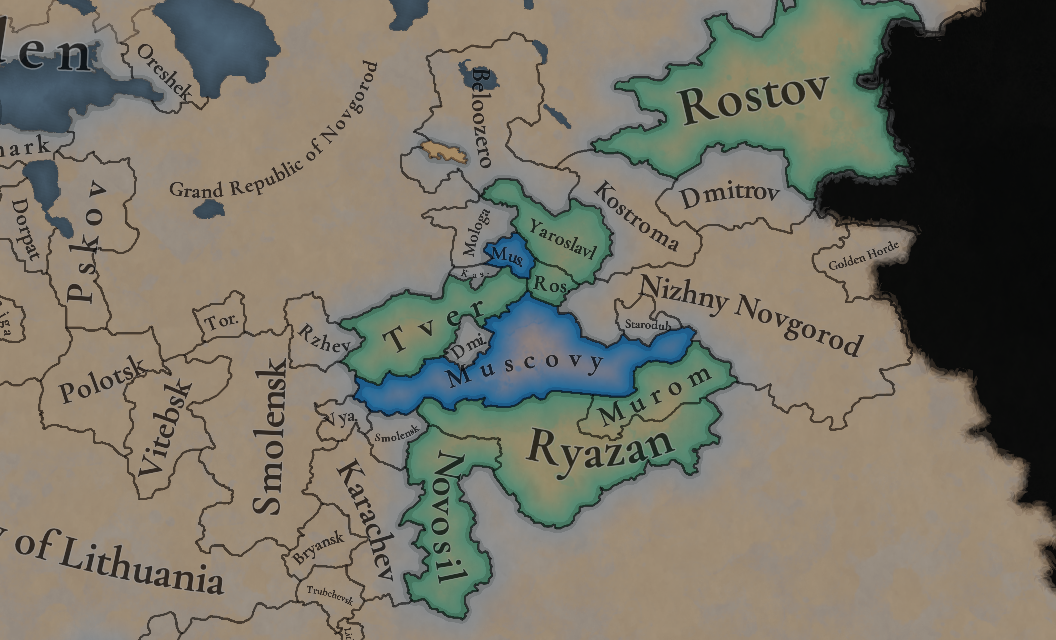
What's this then?
Tatar Yoke
The Tatar Yoke consists of various principalities of Eastern Europe that are subject to Tatar Rule following their invasion in the 13th century. The most prominent of rulers is awarded the title of Grand Prince, and is tasked with collecting tribute from the other tributaries on behalf of the Golden Horde Khan.
Middle Kingdom
The Middle Kingdom is the meaning of China and has been considered the cultural center of East Asia since Antiquity.
This organization is led by the Huángdì, the Emperor of China, who has a number of Fēng Chén, akin to vassals or tributaries, that can be promoted to Celestial Governors, equivalent to the Secretariats that the Yuán dynasty used in the administrative organization of their empire. Its members have a unique societal value, Sinicized vs Unsinicized, and there’s a Tribute system that determines how much Celestial Authority the Huángdì gets, which is used to enforce Laws and Decrees.
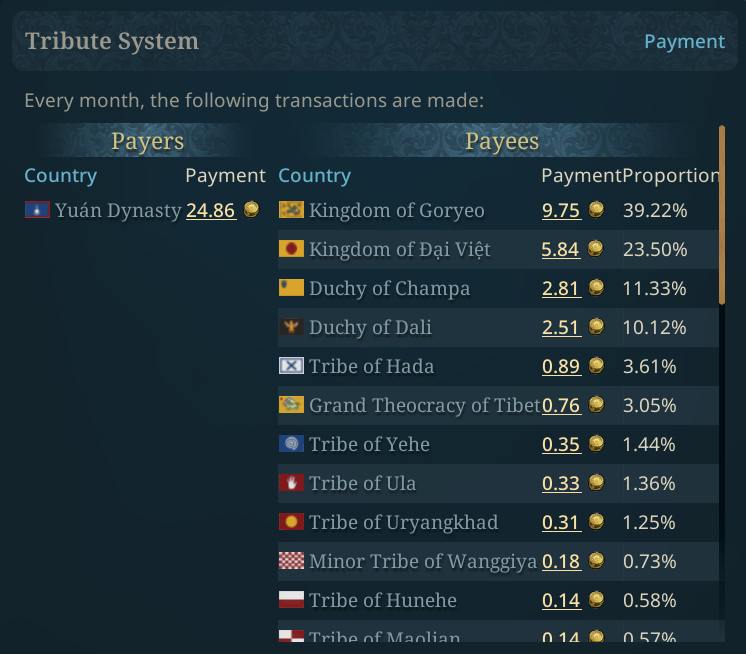
The Tribute system is a system where the Huángdì sends gold to the other nations in the Middle Kingdom, depending on their size.
Holy Roman Empire
The glory of the ancient Roman Empire lives in the memory of all in Europe, Charlemagne was crowned Roman Emperor, but it was not until the coronation of Otto the Great that the current Holy Roman Empire was born, once again recovering the ambitions of a revived and unified European Empire.
This organization, of course led by an Emperor, has different statuses for countries like secular and religious electors, secular princes, free cities, and imperial prelates. It has laws that impact the organization and its members, the most important at the early game being the Golden Bull, which is a must to get approved in order to further develop the institutions of the Empire.
There are others in the game at the moment, like the Shogunate, the High Kingship of Ireland, and many more, as the system is very flexible to use.
Next week we will talk about what Religions we have in the game.
This week we talk about something that is rather new to our GSG, and that is the concept of international organizations. Now this may sound like an anachronistic term, and when you read further in this Tinto Talks, you’ll go “but you already have this in previous games”. Yes, we did have some hard-coded systems in previous games, like the Holy Roman Empire, but what we have here in Project Caesar is a completely dynamic system, 100% scriptable and extendable for modders, which allows for many of these, and with far more flavor.
What is an international organization? Well, at its heart is a group of countries that share some common things, and then quite a few attributes that can be defined for them. The instruction file right now is 140 lines long, and it will keep growing.
Some examples of things that an IO can have are the following.
- If it has a leader or not, and if the leader is a character or a country.
- If it's unique or there can be multiples of it.
- If locations can be owned by it or not.
- Member benefits or penalties.
- Laws and Policies it can have.
- Special statuses inside the organization
- How members will behave during wars
- And dozens more unique attributes.
As we continue our development of this game, we keep adding more of these, adding more unique flavor to the game.
We have “control-groups” like every PDS game has had since EU1, and Stellaris added icons for quick selects… The one for Project Caesar can be pretty much anything in the game, and if you start as a member of an organization, you get a control group for it from the start.
Common Organizations
Let's take a look at some of the generic ones, some of these have been hard-coded systems in previous GSGs, and these are not unique organizations in a campaign, but can exist in multiple instances.
Coalitions
These can be created, with a country as a target, when the target has an aggressive expansion beyond a certain threshold.
Unions
This is a sort of defensive alliance between countries that share the same ruler. They may or may not have different levels of integration.
There are a few others like this, including defensive leagues and tribal federations.
Religious Organizations
Catholic Church
Every country in the world that is part of the Catholic faith is a part of this organization. They have issues that the cardinals vote on, and being a member has implications and restrictions. Of course, this has the added benefit of having Catholic pops in Catholic countries paying a tithe to the Church, which eventually finds its way into the Papacy.
One reason to go Lutheran?
Crusades & Jihads
These are temporary international organizations that will be created when a Crusade or Jihad is called. They have a target set and act like an alliance against that country.
Autocephalous Patriarchates
Meaning self-headed, an Autocephalous Patriarchate is a metropolitan bishop in the Eastern Christian confessions which acts independently and does not depend on or answer to any other hierarchically superior church authority. The different patriarchates then have their own synods of bishops to decide upon anything affecting their own religious jurisdiction.
WiP grahics etc.
There are many of these, for Orthodox, Miaphysite, and other Eastern Christian confessions.
There are many more, some other religions have a central organization, and others have fragmented ones.
Specific Organization
There are also a fair amount of completely unique and flavorful organizations.
What's this then?
Tatar Yoke
The Tatar Yoke consists of various principalities of Eastern Europe that are subject to Tatar Rule following their invasion in the 13th century. The most prominent of rulers is awarded the title of Grand Prince, and is tasked with collecting tribute from the other tributaries on behalf of the Golden Horde Khan.
Middle Kingdom
The Middle Kingdom is the meaning of China and has been considered the cultural center of East Asia since Antiquity.
This organization is led by the Huángdì, the Emperor of China, who has a number of Fēng Chén, akin to vassals or tributaries, that can be promoted to Celestial Governors, equivalent to the Secretariats that the Yuán dynasty used in the administrative organization of their empire. Its members have a unique societal value, Sinicized vs Unsinicized, and there’s a Tribute system that determines how much Celestial Authority the Huángdì gets, which is used to enforce Laws and Decrees.
The Tribute system is a system where the Huángdì sends gold to the other nations in the Middle Kingdom, depending on their size.
Holy Roman Empire
The glory of the ancient Roman Empire lives in the memory of all in Europe, Charlemagne was crowned Roman Emperor, but it was not until the coronation of Otto the Great that the current Holy Roman Empire was born, once again recovering the ambitions of a revived and unified European Empire.
This organization, of course led by an Emperor, has different statuses for countries like secular and religious electors, secular princes, free cities, and imperial prelates. It has laws that impact the organization and its members, the most important at the early game being the Golden Bull, which is a must to get approved in order to further develop the institutions of the Empire.
There are others in the game at the moment, like the Shogunate, the High Kingship of Ireland, and many more, as the system is very flexible to use.
Next week we will talk about what Religions we have in the game.





